Summary
SEO for lawyers is essential for improving a law firm’s visibility on search engines, helping attract quality leads and convert them into clients. It involves optimizing your website to rank higher for legal search terms like “personal injury lawyer near me.” As most people search online for legal services, being on the first page builds trust and credibility. SEO is also cost-effective compared to traditional advertising methods. Local SEO ensures your firm is visible to potential clients in your area, making it a key strategy for growth.
In the competitive landscape of legal services, standing out from the crowd is more crucial than ever. With potential clients turning to Google for answers and recommendations, having a solid online presence can make or break your law firm’s success.
This is where SEO for lawyers comes into play, a powerful tool designed to enhance visibility, attract quality leads, and ultimately convert them into clients.
Imagine your firm appearing on the first page of organic search results when someone searches for “best divorce attorney near me” or “personal injury lawyer.”
Effective SEO strategies not only boost your rankings but also establish trust with potential clients by positioning you as an authority in your field.
Whether you’re just starting to understand SEO (Search Engine Optimization) or looking to refine your current strategy, this law firm SEO guide will delve into everything you need to know about leveraging SEO specifically tailored for attorneys and law firms.
What is SEO for Lawyers?
SEO for lawyers refers to the strategic process of optimizing a law firm’s online presence. The goal is to improve visibility in search engines like Google. When potential clients seek legal help, they often turn to online searches first.
Key components include keyword research, content creation, and technical enhancements tailored specifically for legal services. With targeted efforts in these areas, lawyers can attract more qualified leads.
Why SEO is Important for Lawyers?
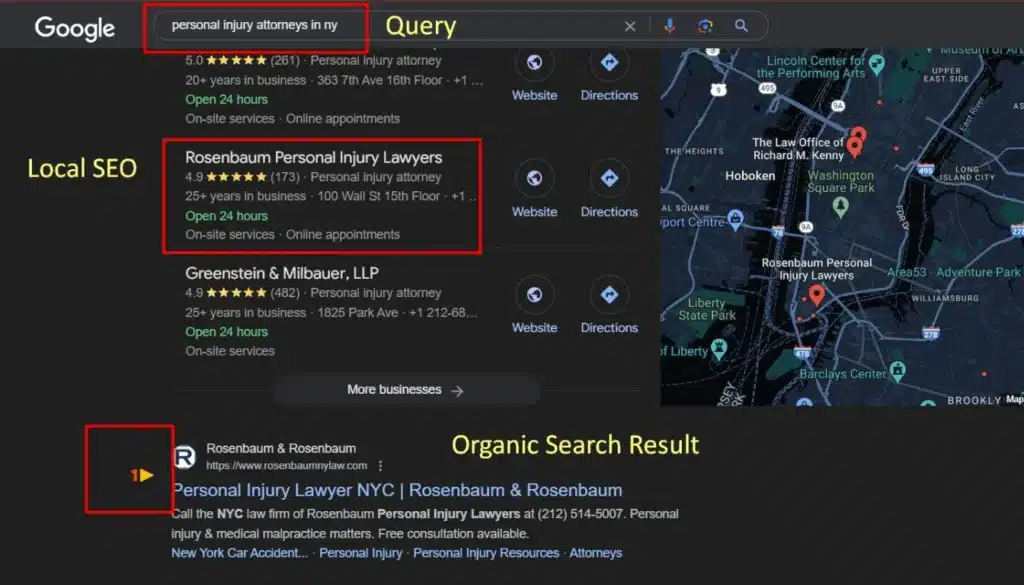
The legal market is increasingly competitive. Potential clients often turn to Google for answers, making a strong online presence essential.
- SEO for law firms helps you stand out in search results.
- SEO makes your firm rank higher on search engines, which leads to more inquiries and ultimately more clients.
- A solid local SEO strategy connects attorneys with their local clients effectively.
- SEO also builds credibility.
- Investing in SEO can yield long-term benefits over traditional advertising methods like PPC or print ads. It enhances brand recognition without recurring costs associated with paid placements.
By prioritizing SEO, law firms not only attract traffic but also nurture relationships that lead to meaningful client connections and sustained growth.
Does SEO Work for Lawyers?

Yes, SEO does work for lawyers. With the right strategies, attorneys can significantly boost their online visibility.
Many law firms have seen remarkable results by optimizing their websites for search engines. When potential clients search for legal services, they often go online first. If your firm appears on the first page of Google, you’re more likely to attract new business.
The effectiveness of SEO lies in targeted keyword research and content marketing strategy tailored specifically for legal niches. By focusing on relevant terms, lawyers can connect with individuals seeking specialized expertise.
Key SEO Ranking Factors for Law Firms
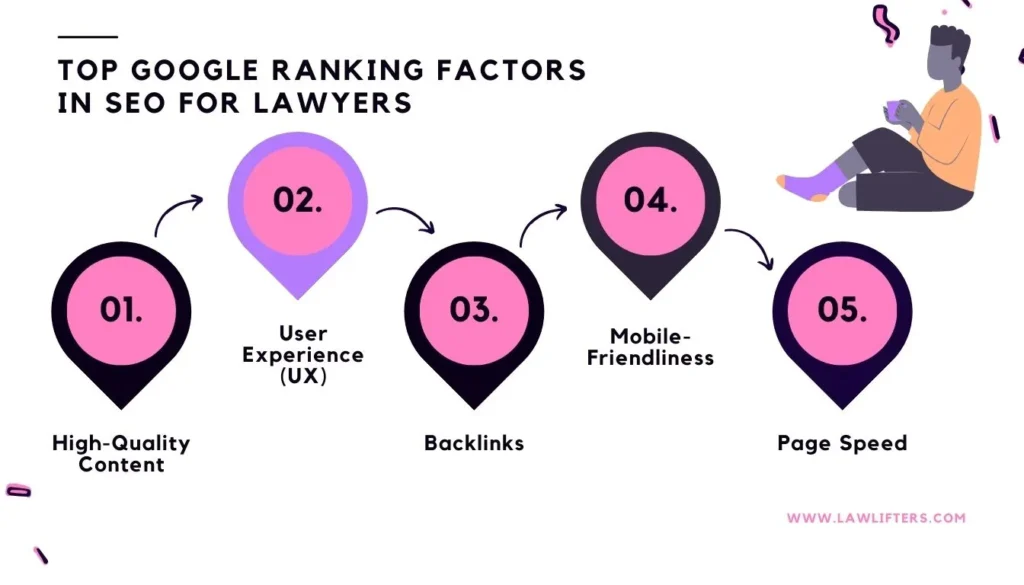
Understanding key SEO ranking factors is essential for any lawyer or law firm aiming to enhance their online visibility. Google’s algorithm considers numerous elements that influence search rankings.
- Quality Content
- On-page SEO
- Technical SEO
- Backlinks and Off-Page Citations
- Local SEO
Content Optimization
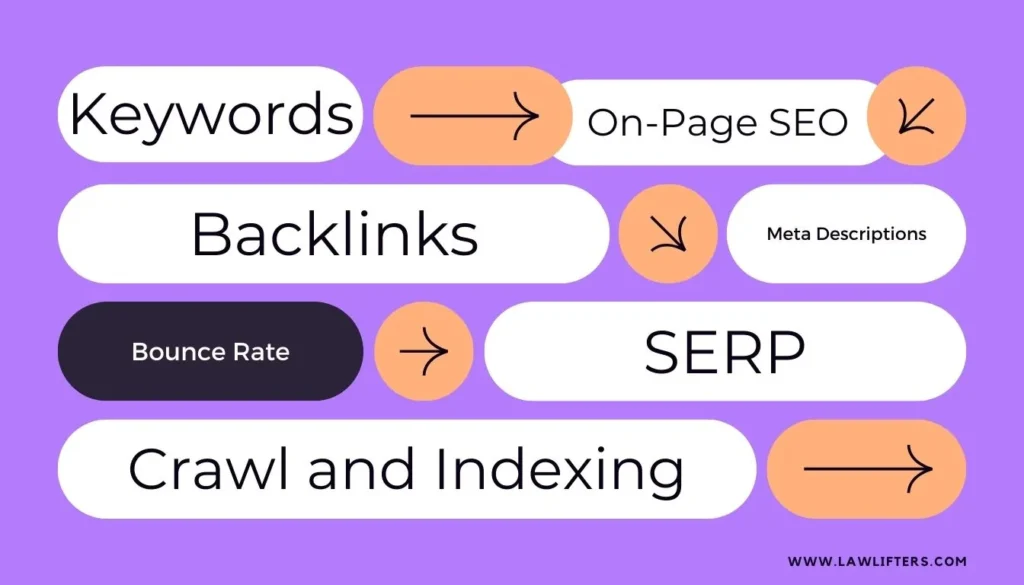
Content optimization is crucial for enhancing your visibility online. By refining your content, you ensure that it resonates with both search engines and potential clients.
Always prioritize quality over quantity. Well-researched and informative pieces will attract more traffic than generic posts filled with fluff.
Types of Content: Blog Posts, Practice Area Pages, FAQs, Case Studies
Creating diverse content types is essential for effective SEO for lawyers.
Blog posts serve as a dynamic way to share insights, updates, and case studies relevant to your practice. They enhance engagement and drive organic traffic.
Practice area pages allow you to delve into specific legal services offered by your firm. This clarity helps potential clients understand exactly what assistance they can expect.
FAQs are invaluable for addressing common client concerns directly. By providing clear answers, you not only improve user experience but also optimize for voice search queries.
Case studies showcase successful results you’ve achieved for clients. These narratives build trust and credibility while illustrating your expertise in real-world situations.
Keyword Research and Optimization
Keyword research is a cornerstone of effective SEO for lawyers. It’s not just about finding popular terms; it’s about understanding the language potential clients use when searching for legal help.
Start by identifying keywords relevant to your practice areas. Keyword research tools like Google Keyword Planner or SEMrush can provide insights into the search volume and competition levels.
Focus on long-tail keywords, which are often less competitive and more specific—ideal for attracting targeted traffic.
Once you’ve gathered your list, optimize your content around these keywords strategically. Use them in headers, Meta descriptions, and throughout the text without keyword stuffing.
Natural integration enhances readability while signaling relevance to search engines.
Fresh, Updated Content
Fresh, updated content is critical in the digital world. For lawyers and law firms, it signals to search engines that your website is active and relevant.
Regularly publishing new articles or updating existing ones can improve your visibility. This practice helps you stay ahead of evolving legal topics and client concerns.
E-E-A-T (Experience, Expertise, Authoritativeness, Trustworthiness)
E-E-A-T stands for Experience, Expertise, Authoritativeness, and Trustworthiness. It’s crucial for lawyers aiming to enhance their online presence.
Experience showcases specific legal cases or challenges you’ve handled, providing real-world examples that demonstrate your practical experience.
Expertise reflects your knowledge in specific areas of law. Potential clients want assurance that you understand the complexities of their legal issues.
Authoritativeness showcases your standing within the legal community. This can be established through publications, speaking engagements, or recognized awards.
Trustworthiness is essential in building client relationships. A well-maintained website with testimonials and case studies helps convey reliability.
Together, these elements form a powerful foundation for SEO success. Google prioritizes content from sources that demonstrate E-E-A-T traits accurately.
Integrating E-E-A-T into your digital marketing strategy will elevate your visibility on search engines while fostering client confidence in your services.
On-Page SEO

On-page SEO is crucial for enhancing your visibility on search engines. It involves optimizing individual web pages to rank higher and earn more relevant traffic.
Meta Tags, Title Tags, Alt Text, Headers
Meta tags play a crucial role in SEO for lawyers. They provide search engines with information about your web pages. This helps your content get indexed correctly.
Title tags are especially important. They should include primary keywords like “law firm” or “attorney”. A compelling title can increase click-through rates, drawing potential clients to your site.
Alt text is often overlooked but equally essential. It describes images on your website, improving accessibility and helping Google understand what the visuals represent. Use relevant keywords here too, enhancing both user experience and search ranking.
Headers organize content effectively, making it easier for users to navigate through articles or service pages. Including keywords in headers not only boosts SEO performance but also guides readers through key points of interest—keeping them engaged longer on your site.
Internal Linking
Internal linking is a powerful tool in the arsenal of SEO for lawyers. It enhances navigation and helps search engines understand the structure of your website.
By creating links between relevant pages, you guide visitors through your content. This keeps users engaged longer and decreases bounce rates—both critical factors for ranking higher on Google.
Featured Snippets
Featured snippets are the coveted answer boxes that appear at the top of Google’s search results. They provide users with quick answers to their queries, making them a goldmine for law firms looking to enhance visibility.
Technical SEO
Technical SEO is the backbone of any successful online presence for lawyers and law firms. It ensures that search engines can effectively crawl and index your website.
Mobile-Friendly Design

A mobile-friendly design is essential in today’s digital landscape. With a significant portion of users accessing websites via smartphones, your law firm needs to cater to this audience.
Responsive design ensures that your site adapts seamlessly to different screen sizes. This approach enhances user experience and keeps visitors engaged longer.
Google prioritizes mobile-friendly sites in its search rankings.
Page Speed Optimization
Page speed optimization is crucial for any law firm looking to enhance its online presence. Slow-loading pages can frustrate potential clients and lead them to seek services elsewhere.
Google recognizes the importance of fast-loading sites, incorporating page speed into its ranking algorithms. A delay of even a few seconds can result in increased bounce rates. Prospective clients expect quick access to information when searching for legal assistance.
Core Web Vitals: LCP, FID, CLS
Core Web Vitals are essential metrics that assess user experience on your website. They focus on three main aspects: loading performance, interactivity, and visual stability.
Largest Contentful Paint (LCP) measures how quickly the largest content element loads. A good LCP score should be under 2.5 seconds to keep visitors engaged.
First Input Delay (FID) gauges responsiveness when a user first interacts with your site. Ideally, FID should be less than 100 milliseconds for a seamless experience.
Cumulative Layout Shift (CLS) evaluates visual stability by tracking unexpected layout shifts during page load. A low CLS score ensures that users won’t encounter frustrating movement as they navigate your content.
HTTPS and Law Firm Website Security
Website security is not just a technical requirement; it’s a necessity for building trust with clients. Using HTTPS encrypts data exchanged between users and your site, safeguarding sensitive information like personal details and payment methods.
Google prioritizes secure websites in search rankings. If you want to rank higher in SEO for lawyers or law firms, implementing HTTPS is crucial. A secure connection signals to both users and search engines that your site is trustworthy.
Site Structure and Navigation

A well-organized site structure is vital for any law firm aiming to enhance its online presence. It shapes how users interact with your website and plays a crucial role in search engine indexing.
Start by creating a clear hierarchy. Main categories should easily lead to subcategories, ensuring visitors can find information quickly. For lawyers, practice areas can serve as primary categories while individual services fall under them.
Navigation should be intuitive. Use descriptive labels for menu items that guide users effortlessly through the site. This enhances user experience and encourages longer visits.
Schema Markup
Schema markup is a powerful tool for enhancing the visibility of your law firm in search engine results. By implementing structured data, you provide Google with valuable information about your practice areas, services, and even client testimonials.
This added layer of detail helps search engines understand your content better. It can lead to rich snippets—those eye-catching results that stand out on the page. Think star ratings or other visual enhancements that draw attention.
Backlinks and Off-Page Citations
Backlinks are essential for boosting your website’s authority. When reputable sites link to yours, it signals to search engines that your content is valuable and trustworthy. This can significantly enhance your SEO for lawyers strategy.
Off-page citations play a similar role. They help establish credibility through consistent mentions of your law firm across various platforms, such as legal directories or social media. Ensuring that your Name, Address, and Phone number (NAP) are consistent strengthens local SEO efforts.
Don’t underestimate the power of online reviews either; they act as both citations and endorsements. Positive feedback not only improves visibility but also builds trust among potential clients seeking legal representation.
Link-Building Strategies
Building a robust backlink profile is crucial for lawyers looking to enhance their online presence. Quality over quantity is key in link-building strategies. Target authoritative legal websites, local business directories, or industry-specific blogs to secure valuable links.
Guest blogging can be an effective approach. Share your expertise on reputable platforms and include links back to your site.
Engaging with community events or sponsoring local organizations can yield backlinks too.
Infographics are another powerful tool. Create informative visuals that other sites will want to share, leading them to link back as a source of information.
Monitor competitor links regularly; identify opportunities they leverage and consider similar tactics tailored for your practice area.
High-Quality Backlinks from Authoritative Sources
High-quality backlinks play a crucial role in boosting your law firm’s SEO strategy. When reputable websites link to your content, they not only enhance your credibility but also signal to search engines that your site is trustworthy.
To acquire these valuable links, focus on creating insightful and relevant content that resonates with industry leaders. Write articles or guides addressing common legal questions or trends related to specific practices. This positions you as an authority and increases the chance of earning links.
Local SEO for Lawyers
Local SEO is most important for lawyers looking to attract clients in their geographic area. When potential clients search for legal services, they often include location-specific terms. This means your firm needs to appear prominently in local results.
Optimizing your online presence begins with ensuring that your website contains relevant keywords tied to your practice and locale. Incorporate phrases like “family lawyer in [City]” into your content naturally.
Google Business Profile Optimization
Optimizing your Google Business Profile is essential for enhancing visibility. This profile serves as a digital storefront where potential clients discover you.
Start by ensuring all information is complete and accurate. Include your law firm’s name, address, phone number, and website URL. Consistency across platforms builds trust with both users and Google.
Add quality images of your office, team, or events to create a welcoming impression. Visuals are powerful tools in attracting engagement.
Local Pack and Map Results
Local Pack results appear at the top of Google search results. They showcase three local businesses relevant to the user’s query. For law firms, this can mean increased visibility and more potential clients.
When someone searches for legal services, seeing your firm in the Local Pack can drive significant traffic to your website. It places your business right where it needs to be, front and centre.
Local SEO Impact and Importance
Local SEO is not just another marketing strategy; it’s important for law firms aiming to attract clients in their geographic area. When potential clients search for legal services, they often look for nearby options. Effective local SEO ensures your firm appears prominently when these searches occur.
Reviews and Reputation Management
Reviews are the lifeblood of any law firm. Potential clients often turn to online reviews when choosing an attorney. A single positive review can tip the scales in your favor.
Negative reviews present a challenge but can also be an opportunity for growth. Address them professionally and resolve issues swiftly; this demonstrates your commitment to customer satisfaction.
Buyer Journey for Law Firm Website
The buyer journey refers to the steps a potential client goes through before hiring a law firm. Understanding this journey helps law firms tailor their websites to guide visitors from the initial stage of discovery to becoming paying clients.
Here’s a breakdown of the buyer journey and how your law firm’s website should support each stage:
1. Awareness Stage: Identifying a Problem

In the awareness stage, a potential client realizes they have a legal problem but may not fully understand what type of lawyer they need or the legal implications of their situation. At this point, they’re searching for general information.
2. Consideration Stage: Evaluating Solutions
In this stage, the potential client knows they need legal help and is evaluating their options. They’re looking for the best law firm that can solve their problem.

3. Decision Stage: Choosing a Law Firm
At this point, the potential client is ready to make a decision. They’ve likely narrowed down their options and are looking to make contact with a firm that can best serve their needs.
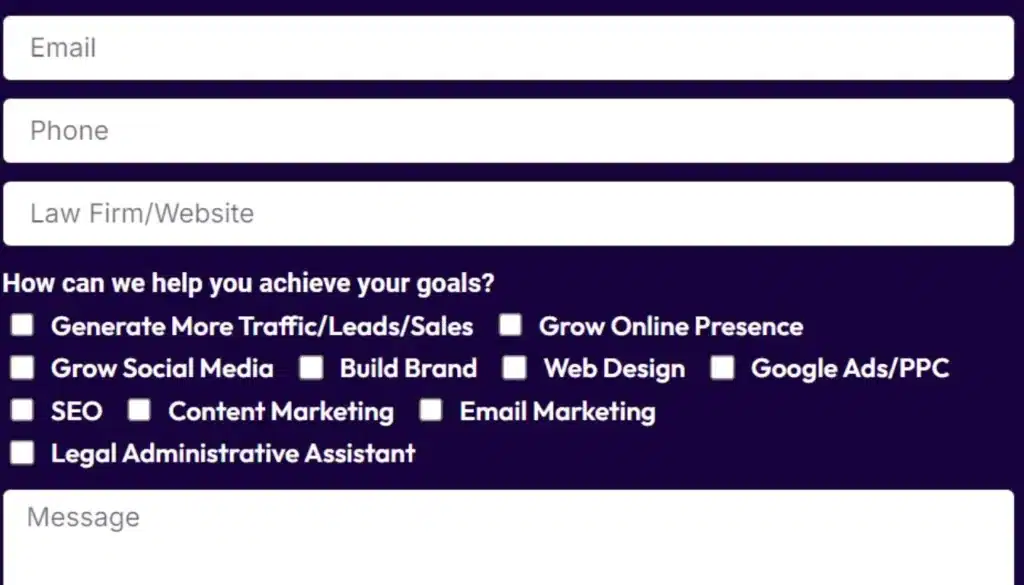
4. Advocacy Stage: Retaining and Referring Clients
Once a client has hired your firm, the relationship doesn’t end. This stage is all about nurturing that relationship and turning satisfied clients into advocates who refer others.

How to Implement Law Firm SEO Strategy
Implementing SEO for law firms begins with a solid foundation.
DIY vs Hiring an Expert SEO Services
Choosing between DIY SEO and hiring an expert for law firm SEO services can be a tough decision. Many attorneys may feel capable of handling their own optimization, especially with the wealth of online resources available. However, SEO is ever-evolving.
A DIY approach allows you to learn valuable skills and save on costs initially. You might implement basic strategies like keyword research or local business listing updates. But time is often a luxury that busy lawyers don’t have.
On the other hand, hiring an SEO expert brings specialized knowledge and experience to your firm’s marketing strategy. They stay updated with algorithm changes and trends that could impact rankings. This expertise translates into better-targeted efforts.
Consider your goals carefully. If you’re aiming for quick results in a competitive market, an affordable attorney SEO professional can provide tailored solutions that yield faster returns on investment than a trial-and-error method might achieve.
Law Lifters: Your Best Law Firm SEO Agency
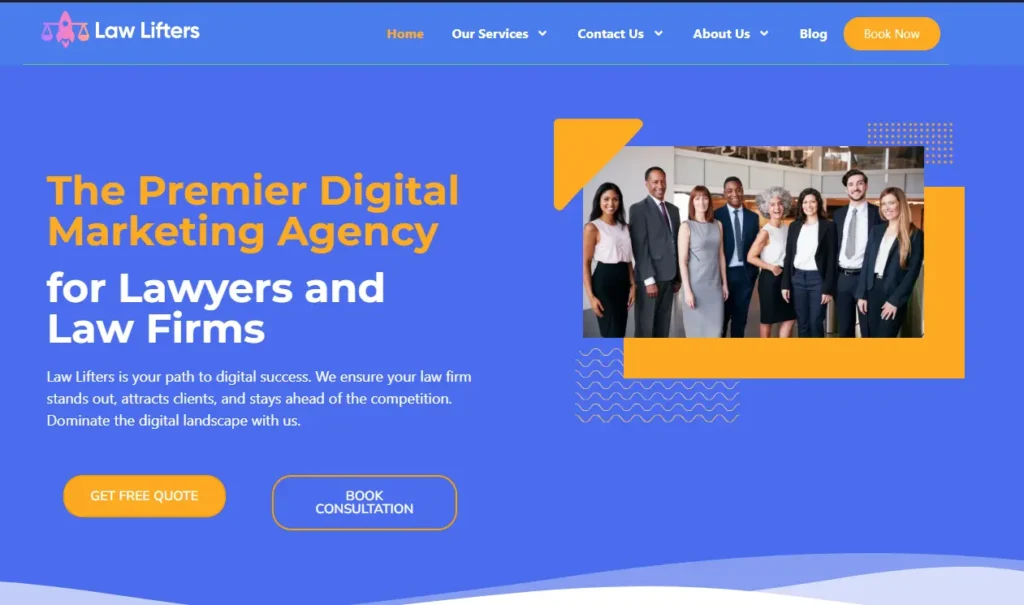
At Law Lifters, we focus exclusively on SEO for law firms, offering tailored legal marketing services designed to meet the specific needs of legal professionals. Our comprehensive law firm SEO services include:
- Comprehensive SEO strategies: We perform keyword research, on-page optimization, and link-building campaigns that improve your rankings for the most relevant legal search terms.
- Local SEO focus: For law firms, local SEO strategies are critical. We optimize your firm’s website and Google My Business profile to ensure you rank highly in local searches and the Google map pack.
- Content creation: Our team creates high-quality content that establishes your law firm as an authority in your practice area, from blog posts to service pages.
- Transparent reporting: We provide clear, easy-to-understand reports that show your progress, from keyword rankings to organic traffic and conversions.
We understand the legal industry, and our professional SEO services are specifically designed to help law firms succeed online. Let us handle your SEO so you can focus on what you do best, practicing law.
Contact us to get a free quote.
SEO Audit for Law Firms
A site SEO audit for law firms is a crucial step in optimizing online visibility. It helps identify strengths and weaknesses in your current strategy.
- Start by analyzing your website’s technical aspects, including loading speed and mobile friendliness.
- Next, check your on-page elements like title tags, Meta descriptions, and content quality.
- Don’t overlook off-page factors such as backlinks.
- Utilizing tools like Google Analytics can provide insights into visitor behavior.
Claiming Your Google Business Profile
Claiming your Google Business Profile is a vital step for law firms looking to enhance their online visibility. This free tool allows attorneys to manage how their practice appears in local searches.
Long-Tail Keyword Targeting
Long-tail keyword targeting is a powerful strategy for attorneys looking to enhance their online visibility. Unlike broad keywords, long-tail phrases are more specific and typically have lower competition.
For example, instead of simply targeting “lawyer,” consider “family lawyer in Chicago.” This approach attracts clients who know exactly what they need.
Growing Your Backlink Profile
Backlinks are essential for boosting your law firm’s online visibility. They act as endorsements from other websites, signaling to search engines that your content is trustworthy and relevant.
To grow your backlink profile, start by creating high-quality content. Informative articles or guides attract attention and encourage others to link back to you.
Secure Your Website
A secure website is crucial for any law firm. It not only protects client information but also boosts your search engine rankings.
Implementing HTTPS is a must. This encryption protocol ensures that data transmitted between your site and its visitors remains private. Google prioritizes secure sites, which can improve your visibility in search results.
SEO Strategies for Lawyers
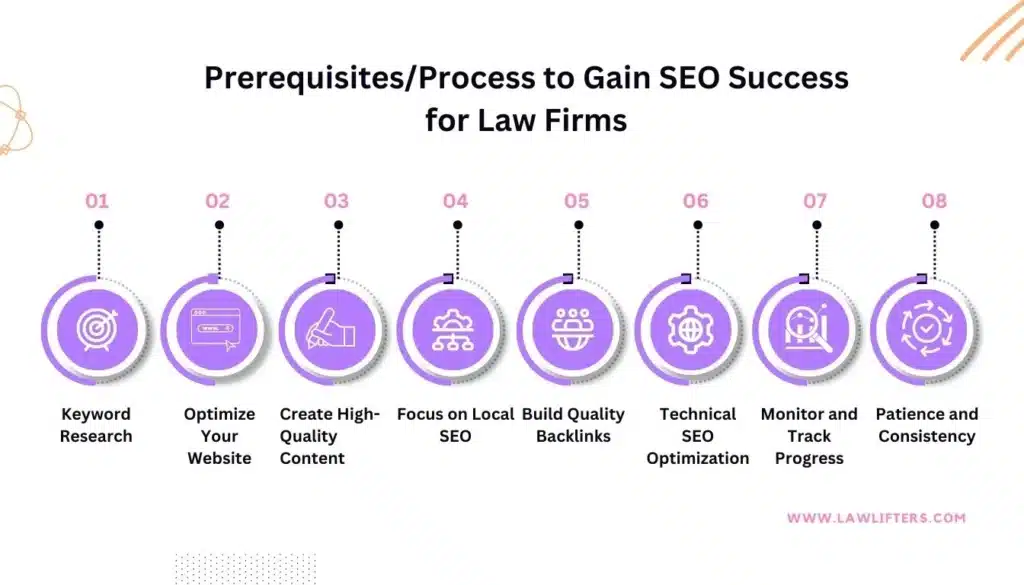
SEO strategies for lawyers focus on enhancing online visibility and attracting potential clients. The legal landscape is competitive, making it essential to implement effective tactics that resonate with your target audience.
Start by optimizing your website’s technical aspects. Ensure fast loading times and mobile responsiveness since many users search for legal services on their phones.
Content Marketing
Content marketing is a powerful tool for law firms aiming to establish authority and connect with potential clients. By creating valuable content, attorneys can address common legal questions and concerns that individuals face.
Blog posts, articles, videos, and infographics are great ways to share insights and expertise. These resources not only educate your audience but also improve search engine visibility. Quality content encourages engagement and boosts organic traffic.
Blogging for SEO
Blogging is a powerful tool for enhancing your law firm’s SEO efforts. It allows you to create fresh, relevant content that caters to the needs of potential clients. By writing about legal topics pertinent to your practice area, you can attract organic traffic.
FAQ Pages
FAQ pages serve as a valuable resource for potential clients. They address common questions and concerns, creating a bridge between your law firm and its audience.
By incorporating relevant keywords, these pages can boost your SEO efforts. Search engines love fresh content that directly answers user queries.
Pillar Content Strategy
A pillar content strategy serves as the backbone of your law firm’s SEO efforts. It organizes your website around central themes, making it easier for search engines to understand and index your content.
Start by identifying key topics relevant to your practice areas. Each topic can be explored in depth through a main pillar page. This page offers comprehensive information, while also linking to several related blog posts or articles that dive deeper into specific subtopics.
Link Building
Link building is a critical element of any successful SEO strategy for law firms. It involves acquiring hyperlinks from other websites back to your own, enhancing your site’s authority and visibility.
Quality matters more than quantity. Target reputable legal sites, local businesses, or industry blogs for backlinks that add value. Guest blogging is an effective way to secure these links while showcasing your expertise.
Guest Blogging
Guest blogging is a powerful tool for lawyers looking to enhance their online presence. By contributing content to reputable legal blogs or industry websites, you can showcase your expertise and build credibility.
When selecting platforms, focus on sites that align with your practice area. This ensures your insights reach a relevant audience. Quality matters—create informative pieces that provide real value to readers.
Referral Links
Referral links are a powerful tool for law firms looking to enhance their online presence. They serve as endorsements from other reputable websites, driving traffic and improving your search engine rankings.
Press Releases
Press releases can be a powerful tool for law firms looking to enhance their online presence. They serve as an official announcement that can attract media attention and improve your visibility in search engines.
Voice Search Optimization
Voice search is rapidly transforming the way people seek legal information. More clients are using voice commands to find attorneys or law firms that cater to their needs.
To optimize for this trend, it’s essential to focus on natural language and conversational phrases in your content. Think about how someone would verbally ask a question rather than type it into a search bar.
Organic vs Paid Search (PPC for Lawyers)
Organic SEO and paid search, Pay Per Click (PPC) advertising serve distinct purposes.
Organic SEO focuses on earning traffic through unpaid strategies like optimizing your website, creating valuable content, and building links. It builds authority over time but requires patience.
On the other hand, PPC offers instant visibility. You can secure top positions in search results by bidding on keywords relevant to your law practice. This approach is effective for immediate lead generation but involves ongoing costs.
While organic traffic tends to provide long-term benefits, PPC can drive quick conversions when needed. Both methods have their place in a well-rounded marketing strategy for attorneys seeking growth and exposure.
Challenges in Law Firm & Attorney SEO
Navigating the world of SEO can be daunting for law firms.
- One major challenge is fierce competition among attorneys. With numerous legal professionals vying for top positions, standing out requires a strategic approach.
- Another hurdle is keeping up with algorithm changes from Google. These updates can impact rankings overnight, making it essential to stay informed and adapt quickly.
- Many lawyers lack time or expertise in digital marketing. Balancing casework with effective SEO practices often leads to frustration.
- Content creation poses another barrier. Crafting valuable insights while ensuring compliance with ethical guidelines demands careful consideration.
- Managing online reputation adds another layer of complexity. Negative reviews can damage credibility and deter potential clients if not addressed promptly and professionally.
Measuring and Tracking SEO Performance
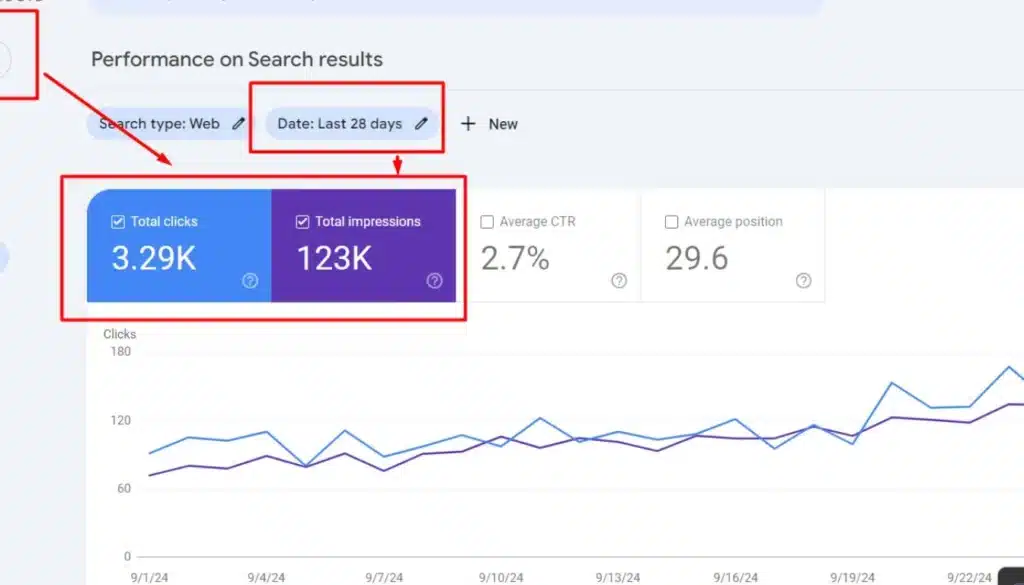
Measuring and tracking SEO performance is crucial for any law firm aiming to enhance its online presence.
Key Performance Indicators (KPIs): Traffic, Rankings, Leads
Key Performance Indicators (KPIs) are essential for measuring the success of your SEO efforts and SEO results. For law firms, three critical KPIs to monitor are traffic, rankings, and leads.
Traffic indicates how many visitors land on your website from search engines. Increased traffic often correlates with improved visibility and relevance in search results.
Rankings reflect where your site appears for targeted keywords. Higher rankings can significantly impact the number of potential clients who discover your services online.
Leads represent prospective clients expressing interest in legal services. Tracking lead generation helps you understand which strategies convert visitors into consultations or retained clients.
SEO Tracking Tools: Google Analytics, Ahrefs
SEO tracking tools are essential for lawyers aiming to enhance their online visibility.
Google Search Console and Google Analytics are powerhouse, offering insights into website traffic and user behavior. It helps attorneys understand which pages attract visitors and how long they stay.
Ahrefs complements this by focusing on backlink analysis and keyword rankings. With its robust features, law firms can identify opportunities for improvement in their legal SEO strategy.
Ongoing SEO Audits and Adjustment
Ongoing SEO audits are essential for law firms aiming to maintain their competitive edge. Regular assessments help identify areas needing improvement and keep your strategies aligned with the ever-evolving landscape of search engines.
SEO Trends and Future Considerations
SEO is constantly evolving, shaped by technology and user behavior. Staying ahead means keeping an eye on emerging trends that could impact your law firm’s visibility.
AI and Natural Language Processing in SEO
Artificial Intelligence (AI) and Natural Language Processing (NLP) are transforming the SEO landscape. These technologies enable search engines to understand user intent better than ever before.
By analyzing context, sentiment, and semantics, AI helps deliver more relevant results. This means that law firms must adapt their content strategies to align with how people naturally ask questions.
AI-Generated Content Challenges
The rise of AI-generated content brings exciting possibilities, yet it also presents significant challenges for legal professionals. One concern is the potential lack of authenticity in machine-generated text. Lawyers often rely on their unique voice and expertise to establish credibility with clients.
Voice Search and Mobile Optimization
Voice search and mobile optimization are now integral parts of any effective SEO strategy for law firms. With the rise of smart devices, many potential clients are using voice commands to find legal services. This trend calls for a shift in how we approach keyword research and content creation.
FAQ's
SEO for law firms is the process of optimizing a law firm’s online presence to improve visibility on search engines, attract more clients, and boost credibility.
SEO for lawyers typically costs between $2,500 to $10,000 per month, depending on the scope and competition.
Hiring an SEO professional can cost anywhere from $1,000 to $5,000 per month, depending on services and expertise.
In law, SEO refers to optimizing a lawyer or law firm’s website to rank higher in search engine results, attracting more relevant leads.



